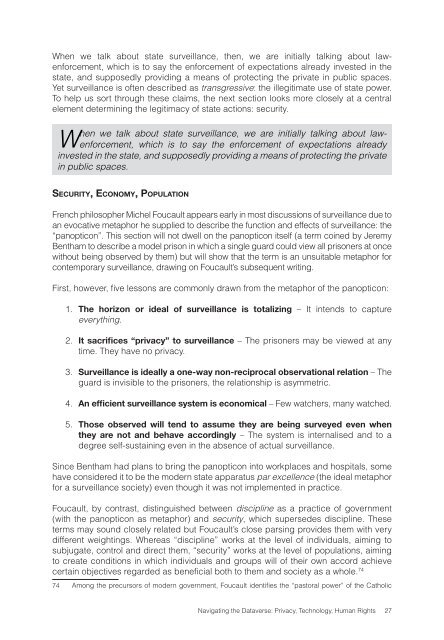Navigating the Dataverse: Privacy, Technology ... - The ICHRP
Navigating the Dataverse: Privacy, Technology ... - The ICHRP
Navigating the Dataverse: Privacy, Technology ... - The ICHRP
You also want an ePaper? Increase the reach of your titles
YUMPU automatically turns print PDFs into web optimized ePapers that Google loves.
When we talk about state surveillance, <strong>the</strong>n, we are initially talking about lawenforcement,<br />
which is to say <strong>the</strong> enforcement of expectations already invested in <strong>the</strong><br />
state, and supposedly providing a means of protecting <strong>the</strong> private in public spaces.<br />
Yet surveillance is often described as transgressive: <strong>the</strong> illegitimate use of state power.<br />
To help us sort through <strong>the</strong>se claims, <strong>the</strong> next section looks more closely at a central<br />
element determining <strong>the</strong> legitimacy of state actions: security.<br />
When we talk about state surveillance, we are initially talking about lawenforcement,<br />
which is to say <strong>the</strong> enforcement of expectations already<br />
invested in <strong>the</strong> state, and supposedly providing a means of protecting <strong>the</strong> private<br />
in public spaces.<br />
Security, Economy, Population<br />
French philosopher Michel Foucault appears early in most discussions of surveillance due to<br />
an evocative metaphor he supplied to describe <strong>the</strong> function and effects of surveillance: <strong>the</strong><br />
“panopticon”. This section will not dwell on <strong>the</strong> panopticon itself (a term coined by Jeremy<br />
Bentham to describe a model prison in which a single guard could view all prisoners at once<br />
without being observed by <strong>the</strong>m) but will show that <strong>the</strong> term is an unsuitable metaphor for<br />
contemporary surveillance, drawing on Foucault’s subsequent writing.<br />
First, however, five lessons are commonly drawn from <strong>the</strong> metaphor of <strong>the</strong> panopticon:<br />
1. <strong>The</strong> horizon or ideal of surveillance is totalizing – It intends to capture<br />
everything.<br />
2. It sacrifices “privacy” to surveillance – <strong>The</strong> prisoners may be viewed at any<br />
time. <strong>The</strong>y have no privacy.<br />
3. Surveillance is ideally a one-way non-reciprocal observational relation – <strong>The</strong><br />
guard is invisible to <strong>the</strong> prisoners, <strong>the</strong> relationship is asymmetric.<br />
4. An efficient surveillance system is economical – Few watchers, many watched.<br />
5. Those observed will tend to assume <strong>the</strong>y are being surveyed even when<br />
<strong>the</strong>y are not and behave accordingly – <strong>The</strong> system is internalised and to a<br />
degree self-sustaining even in <strong>the</strong> absence of actual surveillance.<br />
Since Bentham had plans to bring <strong>the</strong> panopticon into workplaces and hospitals, some<br />
have considered it to be <strong>the</strong> modern state apparatus par excellence (<strong>the</strong> ideal metaphor<br />
for a surveillance society) even though it was not implemented in practice.<br />
Foucault, by contrast, distinguished between discipline as a practice of government<br />
(with <strong>the</strong> panopticon as metaphor) and security, which supersedes discipline. <strong>The</strong>se<br />
terms may sound closely related but Foucault’s close parsing provides <strong>the</strong>m with very<br />
different weightings. Whereas “discipline” works at <strong>the</strong> level of individuals, aiming to<br />
subjugate, control and direct <strong>the</strong>m, “security” works at <strong>the</strong> level of populations, aiming<br />
to create conditions in which individuals and groups will of <strong>the</strong>ir own accord achieve<br />
certain objectives regarded as beneficial both to <strong>the</strong>m and society as a whole. 74<br />
74 Among <strong>the</strong> precursors of modern government, Foucault identifies <strong>the</strong> “pastoral power” of <strong>the</strong> Catholic<br />
<strong>Navigating</strong> <strong>the</strong> <strong>Dataverse</strong>: <strong>Privacy</strong>, <strong>Technology</strong>, Human Rights 27
















